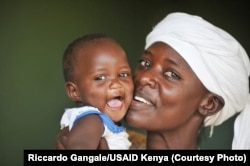Your muscles ache. Your nose is stuffed up. You don’t want to get out of bed. You can’t get warm.
You have the flu.
Expect to be out of commission for a couple of days if you get hit with this nasty virus. Most of us can get a vaccine to lower our chances of infection, but there is one population too young to get this protective shield - newborn babies.
For the first six months of their lives, babies born during flu season are at high risk of contracting the disease. Flu shots are always recommended, but doctors say they're even more important for anyone who will be in close proximity to a newborn.
Doctors also recommend pregnant women get vaccinated to protect themselves. Pregnancy is already tough but having the flu on top of it can have serious effects, and even lead to hospitalization.
Now, research shows that the benefits of flu vaccines not only protect mom, but are transferred to her baby through the placenta and protect it from flu during the vulnerable first two months of life outside the womb.
Passing on protection
Marta Nunes, a research scientist at the University of Witwatersrand in Johannesburg, South Africa, focuses primarily on protecting newborns from vaccine-preventable diseases. Since the flu vaccine is not recommended for babies younger than six months, she is very interested in ways to protect them until they can receive a vaccine.
“Vaccinating pregnant women is a strategy that we wanted to study, if it could work to protect these babies during the early period,” Nunes explained to VOA.
In her study, published in JAMA Pediatrics, she looked at the number of antibodies present in women who received a flu vaccine and those who received a placebo. After their babies were born, Nunes followed them for six months, comparing the number of antibodies in the mothers to those in their infants.
She found that babies born to vaccinated moms were “highly protected” during the first two months, a much higher level than she had seen in a previous study.
Vaccination recommendations
Alejandro Macias is an infectious disease specialist who served as Mexico's Influenza Commissioner during the 2009 pandemic. He participated in a 2015 review for the Global Influenza Initiative that summarized the status of the flu vaccine’s effectiveness for pregnant women and their babies.
Macias tells VOA in an email that Nunes’ work, along with other studies, now confirms the effectiveness of the vaccine in preventing influenza in newborns of mothers who received it.
“From this knowledge, there is absolutely no excuse for any healthcare provider ... for not recommending influenza vaccination to pregnant women.”
Indeed, the results of her study prompt Nunes to encourage all pregnant women, no matter where they live, to get a flu vaccine. Not only to protect themselves, but to protect their little one when it emerges into the world.
Future protection
Very young infants are unable to mount a good immune response, which is why the flu vaccine isn’t recommended until after they turn six months old. However, there are vaccines that stimulate the production of antibodies against other diseases in newborns and Nunes would like to see one for influenza.
While he agrees with that goal, Macias notes that past attempts to develop one have failed due to the immature infant immune system. Still, the results of her study give Nunes hope for a vaccine that is safe and effective for babies after mom’s antibodies wear off.
Until then, Macias stresses, “It is of the utmost importance that those who will be around a newborn or infant be vaccinated against influenza,” to protect the baby during that vulnerable period.





